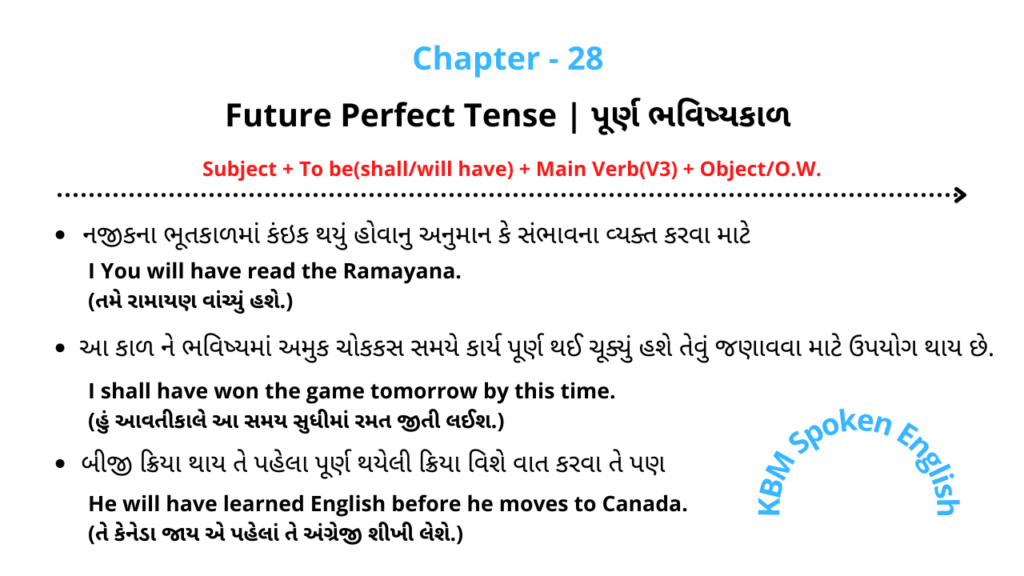
Table of Contents
Future Perfect Tense in Gujarati – પૂર્ણ ભવિષ્યકાળ
મિત્રો, આજના ચેપ્ટરમાં Future Perfect Tense in Gujarati (પૂર્ણ ભવિષ્યકાળ) ના વાક્ય બનાવતા, ઓળખતા અને રોજબરોજમાં ઉપયોગીતા શીખીશું.
કોઈપણ કાળને શીખવા માટે કાળની ઉપયોગીતા અને વાક્યરચના નો ખ્યાલ હોવો જોઈએ.
Sentence structure – વાક્યરચના
1. સૌથી પહેલા Future Perfect Tense Structure (વાક્યરચના) જોઈએ જેથી વાક્ય બનાવતા અને ઓળખતા આવડી શકે છે.
Subject + To be(shall/will have) + Main Verb(V3) + Object/O.W.
2. હવે વાક્ય રચના મુજબ Subject તરીકે કોણ હોય છે, તો તેનો આપણને ખ્યાલ હોવો જોઈએ.
એટલે કે કર્તા તરીકે નીચેના વ્યક્તિવાચક સર્વનામો અથવા કોઈ એકવચન કે બહુવચન નામ હોઈ શકે છે જેના વિશે details માં જાણવા માટે The Personal Pronouns ચેપ્ટરમાં તમે સરળતાથી શીખી શકો છો.
| Singular-એકવચન | Plural-બહુવચન | |
| પ્ર.પુ | I (હું) | We (અમે) |
| બી.પુ | You (તું) | You (તમે) |
| ત્રી.પુ | He (તે) | They (તેઓ) |
| She (તેણી,તે) | ||
| It (તે) – નિર્જીવ માટે | ||
| Name – એકવચન નામ | Name – બહુવચન નામ |
3. ત્યારબાદ કયા Subject સાથે કયો Helping Verb(shall/will have) લગાડી શકાય તો જેમ કે..
મિત્રો, Helping Verb(shall/will have) પરથી વાક્ય પણ ઓળખી શકીએ છીએ કે વાક્ય Future Perfect Tense નુ છે.
| Singular-એકવચન | Plural-બહુવચન | |
| પ્ર.પુ | I – shall/will be = I’ll be | We – shall/will be = We’ll be |
| બી.પુ | You – will be = You’ll be | You – will be = You’ll be |
| ત્રી.પુ | He – will be = He’ll be | They – will be = They’ll be |
| She – will be = She’ll be | ||
| It – will be = It’ll be | ||
| ‘Name’ = Raju will be | ‘Name’ = Ants will be |
‘I’ અને ‘We’ સાથે Normal future બતાવવા માટે ‘shall‘ ઉપયોગમાં આવે છે, એટલે કે કોઈ પ્લાન કર્યો હોય, કોઈ અપેક્ષા રાખી હોય કે આગાહી આપવાની હોય છે અને Strong future બતાવવા માટે હંમેશાં ‘will’ જ ઉપયોગમાં આવે છે, એટલે કે કોઈ વચન આપેલું હોય, આદેશ આપ્યો હોય કે નિશ્ચય કરયો હોય છે.
જ્યારે બાકી બધા જ Personal Pronouns સાથે ‘will’ ઉપયોગમાં આવે છે.
| Subject | Normal Future | Strong Future |
| I/We | shall | will |
| You/He/She/It/They/Name | will | will |
4. વાક્ય રચના મુજબ મુખ્ય ક્રિયાપદ નું ત્રીજું ફોર્મ(V3) આવે છે.
મુળક્રિયાપદ(V1) નુ ભુતક્રુંદત(V3) રૂપ કેવી રીતે બને છે, તો તેનો આધાર Category મુજબ પડે છે જેમ કે Regular Verbs અને Irregular Verbs, Regular Verbs માં ‘V1’ ના છેડે ‘d/ed/ied’ જોડાઈ ને ‘V3’ forms બને છે અને Irregular Verbs માં ‘V3’ ના છેડે ‘ed’ આવતો નથી એટલે કે કોઈ નિયમ લાગુ પડતો નથી.
મિત્રો, Regular Verbs and Irregular Verbs ને શીખવા માટે ચેપ્ટર Forms of main verbs(V1,V2,V3) માં detail થી શીખી શકો છો.
કેટલાક સમય-સૂચક શબ્દો નો Future Perfect Tense માટે ઉપયોગ થાય છે, જેના પરથી આ કાળને ઓળખી શકાય છે અને વાક્ય પણ બને છે.
- By next time (by next month, by next Monday, by next October…)
- By (January, Monday, 2022…)
- In (2022, Sunday, week…)
- Before ( Monday, 2023, Diwali…)
Future Perfect Tense Sentences in Gujarati – પૂર્ણ ભવિષ્યકાળના વાક્યો
- He will have learned English before he moves to Canada.
- તે કેનેડામાં જાય તે પહેલાં તે અંગ્રેજી શીખી લેશે.
- They will have finished their work in Jan 2022.
- તેઓ જાન્યુઆરી 2022 માં તેમનું કામ પૂરું કરી લેશે.
- Will you have arrived tomorrow by 11am?
- શું તમે આવતીકાલે સવારે 11 વાગ્યા સુધીમાં આવી જશો?
- She‘ll’ve had her dinner by then.
- તે ત્યાં સુધીમાં તેણીનું રાત્રિભોજન કરી લેશે.
- When you will arrive at 9am, the bus will have left.
- જ્યારે તમે સવારે 9 વાગ્યે પહોંચશો, બસ રવાના થઈ ગઈ હશે.
Future Perfect Tense use in Gujarati – પૂર્ણ ભવિષ્યકાળ નો ઉપયોગ
બીજી ક્રિયા થાય તે પહેલા પૂર્ણ થયેલી ક્રિયા વિશે વાત કરવા બે ક્રિયાઓ માં હમેંશા પહેલી ક્રિયા Future Perfect Tense માં અને સાથે બીજી ક્રિયા Simple Present Tense માં જ દર્શાવાય છે.
- He will have learned English before he moves to Canada.
- તે કેનેડા જાય એ પહેલાં તે અંગ્રેજી શીખી લેશે.
- They will have bought the Car before the Car new model does not launch.
- કારનું નવું મોડલ લોન્ચ ન થાય તે પહેલા તેઓએ કાર ખરીદી હશે.
આ કાળ ને ભવિષ્યમાં અમુક ચોકકસ સમયે કાર્ય પૂર્ણ થઈ ચૂક્યું હશે તેવું જણાવવા માટે ઉપયોગ થાય છે. જેમ કે..
- I shall have won the game tomorrow by this time.
- હું આવતીકાલે આ સમય સુધીમાં રમત જીતી લઈશ.
- She will have reached in Canada by next month.
- તેણી આવતા મહિના સુધીમાં કેનેડા પહોંચી ગયેલી હશે.
નજીકના ભૂતકાળમાં કંઇક થયું હોવાનુ અનુમાન કે સંભાવના વ્યક્ત કરવા માટે Future Perfect Tense નો ઉપયોગ થાય છે.
- You will have read the Ramayana.
- તમે રામાયણ વાંચ્યું હશે.
- He will have heard the her name.
- તેણે તેણીનું નામ સાંભળ્યું હશે.
Negative Sentences – નકાર વાક્યો
Sub + shall/will + not + have + V3 + Object. (will not + won’t)
- We will not have celebrated to party by next month.
- I think he won’t have watched movie tomorrow by at this time.
Verbal Or Yes/No Interrogative Sentences – પ્રશ્નાર્થ વાક્યો
Shall/Will + Sub + have + V3 + Object ?
- Will they have celebrated to party by next month?
- Will he have watched movie tomorrow by at this time?
Negative Yes/No question sentences – નકાર પ્રશ્નાર્થ વાક્યો
Shall/Will + Sub + not + have + V3 + Object?
- Won’t they have celebrated to party by next month?
- Will he not have watched movie tomorrow by at this time?
મિત્રો, આગળ ના ચેપ્ટરો શીખવા માટે તમે Grammar menu પર જઈ શીખી શકો છો.